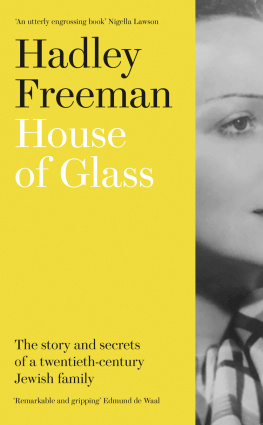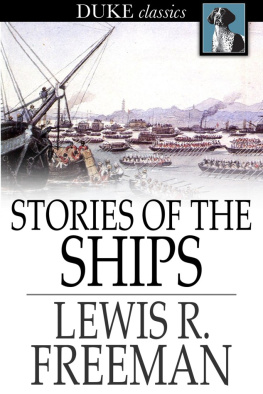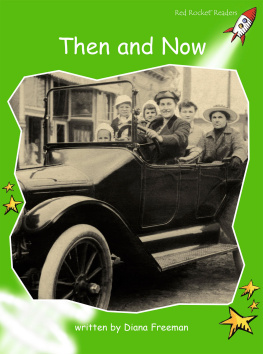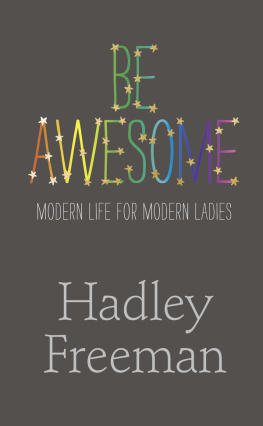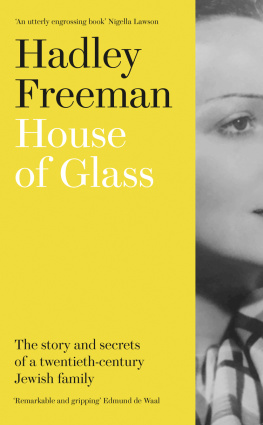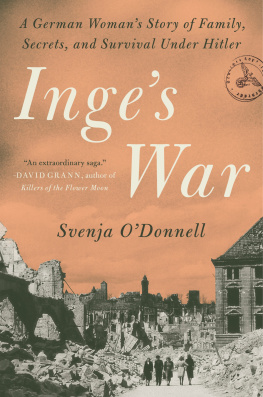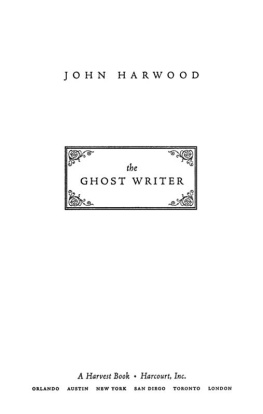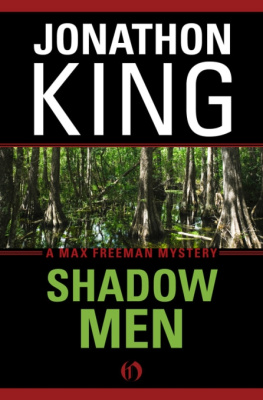CONTENTS
Contents
Guide
HOUSE OF GLASS
The story and secrets of a twentieth-century Jewish family
Hadley Freeman

Getting this hysterical about [anti-Semitism] on the other side of the world is sane?
When she talks about it, its not on the other side of the world, its on the next block.
And thats sane?
I dont know what it is! I just get the feeling sometimes that she KNOWS something, something that Its like shes connected to some some wire that goes half around the world, some truth that other people are blind to.
ARTHUR MILLER , Broken Glass, 1994
Be Awesome
Life Moves Pretty Fast
4th Estate
An imprint of HarperCollinsPublishers
1 London Bridge Street
London SE1 9GF
www.4thEstate.co.uk
First published in Great Britain by 4th Estate in 2020
Copyright Hadley Freeman 2020
Hadley Freeman asserts the moral right to be identified as the author of this work.
Images
Image believed to be by Ren Gruau.
Broken Glass by Arthur Miller. Copyright Arthur Miller and Inge Morath, 1994, used by permission of The Wylie Agency (UK) Limited.
A catalogue record for this book is available from the British Library.
All rights reserved under International and Pan-American Copyright Conventions. By payment of the required fees, you have been granted the non-exclusive, non-transferable right to access and read the text of this e-book on-screen. No part of this text may be reproduced, transmitted, down-loaded, decompiled, reverse engineered, or stored in or introduced into any information storage and retrieval system, in any form or by any means, whether electronic or mechanical, now known or hereinafter invented, without the express written permission of HarperCollins.
Source ISBN: 9780008322632
Ebook Edition January 2020 ISBN: 9780008322649
Version: 2020-03-09

Australia
HarperCollins Publishers Australia Pty. Ltd.
Level 13, 201 Elizabeth Street
Sydney, NSW 2000, Australia
www.harpercollins.com.au
Canada
HarperCollins Canada
Bay Adelaide Centre, East Tower
22 Adelaide Street West, 41st Floor
Toronto, Ontario M5H 4E3, Canada
www.harpercollins.ca
India
HarperCollins India
A 75, Sector 57
Noida, Uttar Pradesh 201 301, India
www.harpercollins.co.in
New Zealand
HarperCollins Publishers New Zealand
Unit D1, 63 Apollo Drive
Rosedale 0632
Auckland, New Zealand
www.harpercollins.co.nz
United Kingdom
HarperCollins Publishers Ltd.
1 London Bridge Street
London SE1 9GF, UK
www.harpercollins.co.uk
United States
HarperCollins Publishers Inc.
195 Broadway
New York, NY 10007
www.harpercollins.com
Austro-Hungarian Empire, 1900s
H ENRI , J ACQUES , A LEX AND S ARA G LASS loved being French, and the reason was that they werent French and their names werent Henri, Jacques, Alex and Sara Glass. They were born Jehuda, Jakob, Sender and Sala Glahs in what is now Poland but was then still Austria-Hungary. This caused further confusion about the nationality of the Glasses in life and death: Alex was often described in newspaper articles in his lifetime as Austrian and Salas death certificate states her place of birth simply as Austria. This was echoed by several of her friends from later life who told me that she spent her early years in Vienna, I think. In fact, Sala grew up more than 400 kilometres away from Vienna and the Glahs family probably never visited what is now Austria at all. They were from Chrzanow, once a busy market town whose name derives, with a memorable lack of romanticism, from the Polish word for horseradish (chrzan), a local speciality. Its region was more elegantly named, Galicia, in what is now Polands south-west corner.
Chrzanow was a typical early twentieth-century eastern European shtetl, or Jewish village, the kind thats so familiar from popular culture that even those who lived there describe it through the prism of art, flattening reality to something close to clich. The very few times my grandmother referred to her childhood she talked about it in reference to Fiddler on the Roof, and the memoir of a townsperson who lived there at the same time as the Glahs siblings described its picturesque side streets as looking like those in Chagalls paintings, poor and crooked. When I visited Chrzanow in 2018 my guide compared it to the towns in stories by Isaac Bashevis Singer. But Chrzanow has its own unique qualities that lift it beyond the generic. Back when the Glahses lived there it was known for its surrounding dark forests of densely packed silver birch trees where the children would hide to avoid their parents and school teachers. It also had an exceptionally pretty central square, fringed with colourful houses and shops, where people from miles away would come to do their shopping. Today, it is better known for the more dubious accolade of being only 20 kilometres from Auschwitz, so close the two towns considered themselves to be sisters.
None of the Glahs siblings ever spoke about their childhoods, and if they mentioned Poland at all theyd spit with disgust and move on, no elaboration necessary. So without personal anecdotes to act as my starting point, I turned to historical documents. If my family had been one of the famous Jewish dynasties the Rothschilds, say, or the Freuds, or even the Halberstams, a wealthy family who lived in the region at the time this would have sufficed. But they were not, and it did not. There arent many records of the individual billions of poorer lives from Europes past, people who leave only footprints in the sand that blow away as soon as they are buried; people who leave, at most, unidentifiable black and white photos behind them, their faces blankly solemn for the photographers studio, the flash bleaching them of personality; or perhaps a brief mention in a census locked away in an obscure government vault that proves they once existed and nothing more. These people are merely referred to by history as the poor, the peasants, the illiterate, even though their lives are far more revealing of the times in which they lived than those of the grander families whose lives are faithfully recorded ever after by historians.
My father mentioned that back in the 1970s my great-uncle Alex claimed to have written a memoir, which was never published, but my father couldnt remember if hed even ever seen it, let alone read it. If it existed at all, it had surely long been thrown away, but it seemed more likely that this was another one of Alexs many implausible boasts, that he once wrote a memoir that somehow no one had ever seen. The idea that Alex could ever have had the patience to sit down and write an entire book seemed about as likely as me hanging out with Picasso. But one day in 2014, my fathers younger brother, Rich, emailed from Florida: he had found Alexs memoir among my grandmothers possessions. A week later it arrived, a bulky FedEx package, the pages untouched for at least twenty years, since my grandmother died. It was typed in French on loose-leaf paper and Alex had almost certainly dictated it to an assistant who then typed it up, because it read just as Alex talked, in his gruff, colloquial, rat-a-tat stream of consciousness: I still have my Yiddish accent. Ive never tried to correct it. I love Yiddish. It is my mother tongue. The language I spoke when I knew hunger. When I fought those degenerate Poles who wished me dead, he wrote on the first page. It was like he was standing in front of me in his flat in Paris, shaking his finger wildly, jabbing it at invisible opponents. (The first time I saw Joe Pesci in a movie I nearly fell off my seat in shock because, if you swap the Italian heritage for a Jewish one, Pesci looks and talks, and swaggers and gesticulates a lot like my great-uncle Alex did.) My father, with characteristic heroism, translated all 250 pages of Alexs memoir for me from French to English (my French is fine but in no way is it strong enough to handle Alexs punchy slang with occasional swoops into Yiddish). But before he sent the translation back to me, he warned me to read it with at the very least a sceptical eye: Alexs tendency towards self-mythology was infamous, and not even those closest to him ever really believed what he said about himself. So while this memoir was an astonishing find, I opened it expecting to read a somewhat deadening litany of Alexs triumphs. Instead, I was amazed to discover that the first thirty or so pages were a detailed and humble account of his childhood in Chrzanow, a period of his life he certainly never discussed with any of us. Instead of focusing on himself and his glories, he wrote heartfelt descriptions of his family and their struggles, and lives that had been hidden in darkness for over a century burst into the light.

